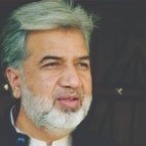

Go to Admin » Appearance » Widgets » and move Gabfire Widget: Social into that MastheadOverlay zone

Author: Ansar Abbasi
The National Counter Terrorism Authority (Nacta) can become an effective institution only if placed directly under the control of Prime Minister (PM) Imran Khan, official sources told The News.
On Tuesday, Khan became the first premier to chair a meeting of the Nacta board of governors since the pivotal organisation was formed in 2009, at the height of the Tehrik-i-Taliban Pakistan (TTP) terror campaign.
Time and again, the governments elected since the restoration of democracy in 2008 promised to strengthen Nacta, which is considered crucial for coordination between intelligence and security agencies to effectively check terrorism. It did not do so.
According to official sources, Nacta could only become effective with the PM in the driving seat. However, none of the four prime ministers who held office during the last 10 years prioritised the development of the organisation, which is modeled on the US Homeland Security Department formed after the September 11, 2001 al-Qaeda attacks.
PM Khan broke that inexplicable trend on Tuesday. Chairing the board meeting, he said that the current ground realities call for revisiting the role of Nacta in order to make it a truly proactive organisation with a well-defined mandate. The board constituted a committee to review the role and functions of Nacta, and submit its recommendations to the PM within a week.
On paper, Nacta is a highly powerful body. Its board of directors is chaired by the PM and its members include all the provincial chief ministers, the chief minister of Gilgit-Baltistan, the PM of Azad Jammu and Kashmir, the federal ministers of interior, law, defence and finance, the directors-general of the Inter-Services Intelligence and Military Intelligence directorates, the directors-general of the Intelligence Bureau and the Federal Investigation Agency and the chief secretaries, home secretaries and police inspectors-general of all the provinces.
Despite being administratively formed in 2009 and consolidated by an act of parliament in March 2013, Nacta remained dormant while thousands of Pakistanis were killed by the TTP and other terrorist groups.
The official sources said that Nacta is the most relevant institution to curb terror. For this very reason, the National Action Plan drawn up in the aftermath of the horrific terrorist attack on the Army Public School, Peshawar, in December 2014 vowed to strengthen it. However, since then, Nacta has been starved of funds and competent officers needed to fulfill its legal mandate.
Similarly, despite repeated requests made to past prime ministers, not even a single meeting of the high-powered Nacta board was held, although it is legally required to meet every three months.
The sources told The News that Nacta, which is an attached department of the interior ministry, has not been taken seriously by the powerful intelligence agencies. Unfortunately, there has also been a tussle over whether a civilian official or military officer should lead the organisation.
The Nacta law and National Security Policy propose the establishment of a joint intelligence directorate to act as a coordination mechanism for more than 30 intelligence and security agencies to collectively combat terrorism.
However, this concept is yet to be put into practice. Pakistan is thus unique inasmuch that so many agencies — each reporting to different bosses — working without any oversight or coordination.
The official sources believed that Nacta could be strengthened only if it is placed under the direct control of the PM instead of the interior ministry. This way, it would become too important to be ignored.
Besides ensuring coordination among the agencies, the PM-supervised Nacta could also be used to oversee the intelligence agencies, the sources suggested.
In 1989, Air Marshal Zulfikar Ali Commission had recommended the formation of a PM-led National Security Council and the establishment of a Joint Intelligence Committee to ensure that the intelligence agencies operate within the parameters of their respective legal mandate. These proposed institutions were also considered vital to ensure coordination between the intelligence agencies.
“In order to ensure that the entire intelligence activity at the national level receives a unified policy direction and there is coordination between various intelligence agencies, it is considered necessary that a standing committee of the cabinet is created for the purpose, on the pattern of those existing in the UK, USA, Germany, France, India and Israel,” the commission had proposed.
(Published in Monthly Tribute International on 01-10-2018)
You must be logged in to post a comment Login